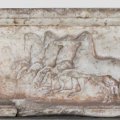UQ’s Dr Elizabeth Stephens is set to investigate why consumers are more likely to buy a “clinically proven” cosmetic product.
Dr Stephens, from the Centre for the History of European Discourses, has received an $80,000 UQ Foundation Research Excellence Award, which will be used to study the cultural impact of new medical imaging technologies.
These technologies include magnetic resonance imaging, micro-cameras used in surgery and ultrasound imaging.
“Images of internal anatomy made possible by these technologies have quickly come to circulate across a wide range of popular media,” Dr Stephens said.
“Examples of this include government campaigns against smoking which show images of diseased lungs, and advertisements for skin creams that use anatomical illustrations of the dermis.”
Dr Stephens said anatomical images were persuasive because they were perceived to be a true, objective representation of the body.
“While most other representations of bodies circulating in the public sphere are recognised to be shaped by cultural values and norms, anatomical images occupy a highly and unusually privileged cultural position,” she said.
“The technologies used to produce these images are believed to portray the inside of the body in a direct and honest way.”
The commercial world has taken advantage of this perception, with medical imaging commonly used in market research.
“In neuromarketing, scans of the brain’s chemical activity are measured as test subjects respond to commercial products,” Dr Stephens said.
“The results are then read in a way that posits a direct correlation between what these images show and the test subject’s level of emotional or affective engagement.”
Dr Stephens’ project will involve cultural analysis of how anatomical images are viewed by both the medical profession and the general public.
She said she hoped the results were useful to medical researchers, who were under increasing pressure to respond to external criticisms from the public about how it ‘sees’ bodies.
“The increasingly routine practice of screening for fetal abnormalities is one example of this,” Dr Stephens said.
“Patient advocacy groups such as the Deaf Culture Movement and people identified with Down’s syndrome have recently challenged the medical diagnosis of these conditions as disabilities and questioned their standard treatment by the medical profession.
“At present, there is no unified framework that enables practitioners to respond to what are often highly individualised patient needs in a consistent and systemic way.
“This project aims to develop a framework to develop practical strategies for response.”
Dr Stephens also aims to establish a collaborative research network, enabling medical researchers to work collaboratively with cultural analysts.
“Research networks serve an increasingly important role in catalysing collaborations across disciplines,” she said.
“The project aims to demonstrate how an exchange across the humanities and sciences can productively address issues of current concern to both fields of research.”
Dr Stephens was presented with her award at a special ceremony at Customs House on Wednesday, September 22, as part of UQ’s annual Research Week.
The UQ Foundation Research Excellence Awards have been running for 12 years and are an initiative of UQ to recognise outstanding performance and leadership potential in early career researchers.
This year’s awards totaled $910,000.
Media: Dr Elizabeth Stephens (07 3346 9493, e.stephens@uq.edu.au) or Penny Robinson at UQ Communications (07 3365 9723, penny.robinson@uq.edu.au)
.jpg)









